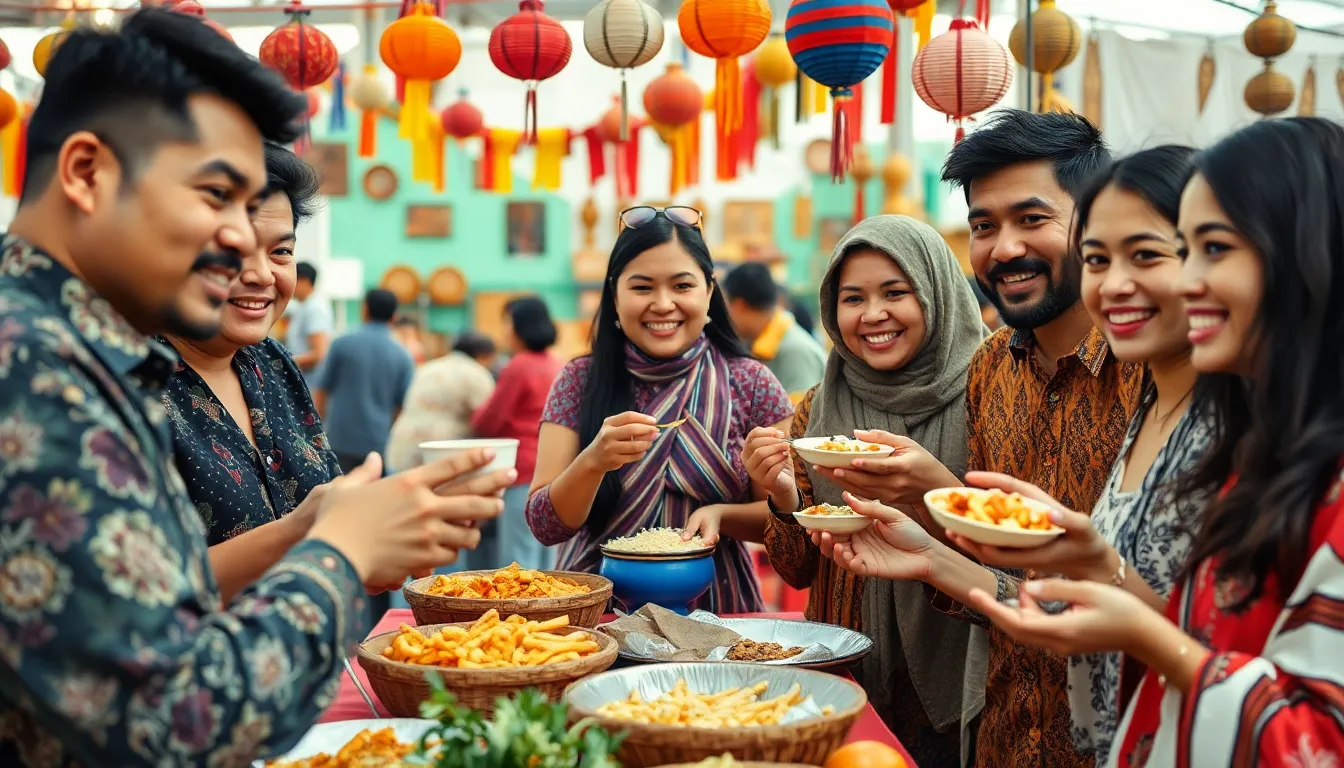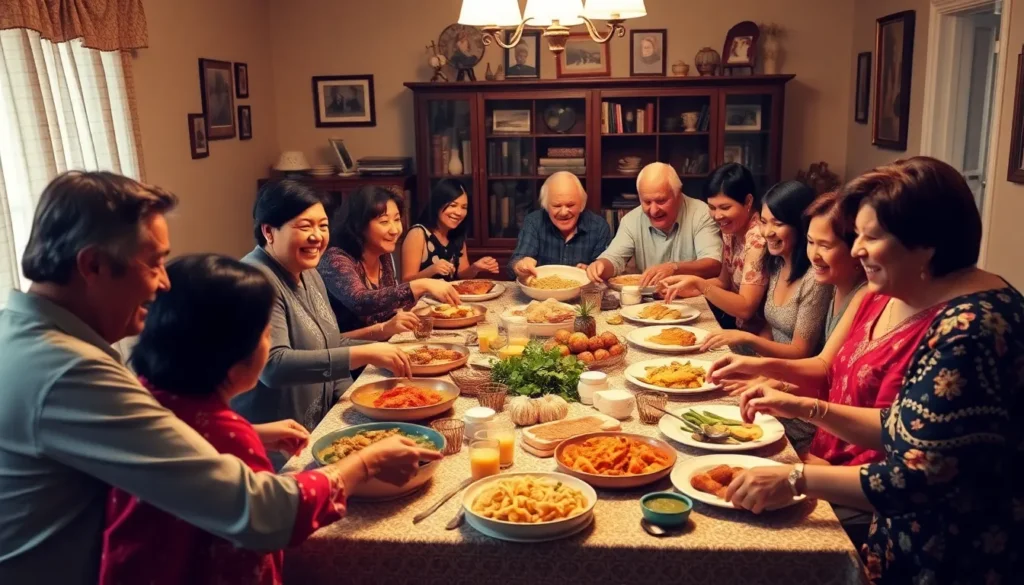Cultural roots shape who we are, influencing our beliefs, values, and even our taste in pizza toppings. These deep-seated traditions connect individuals to their heritage, creating a rich tapestry of shared experiences and stories. Imagine a world where everyone embraced their cultural roots—there’d be less confusion at family gatherings and a lot more delicious food!
Table of Contents
ToggleUnderstanding Cultural Roots
Cultural roots establish the foundation for individual identity and community connection. Exploring their meanings and importance reveals their profound influence on lives.
Definition of Cultural Roots
Cultural roots refer to the shared beliefs, traditions, and practices passed down through generations. These elements shape individuals’ identities and dictate social behaviors. They include language, religion, customs, and values. Various cultural roots reflect historical contexts and environments, enriching communities with diversity. Understanding these connections fosters appreciation for different backgrounds and experiences.
Importance of Cultural Roots
Cultural roots play a crucial role in forming a sense of belonging and identity. They help individuals understand their heritage and connect with their ancestors. Shared traditions create common bonds, allowing communities to maintain unity. In social gatherings, these roots enhance experiences, reinforcing connections among family and friends. They also promote cultural preservation, ensuring that unique practices remain alive for future generations. Embracing cultural roots enriches personal experiences and encourages broader societal understanding.
Historical Perspectives on Cultural Roots

Historical perspectives on cultural roots reveal the deep connections between heritage and identity. Examining ancient civilizations provides critical insights into how foundational beliefs and practices shaped modern societies.
Ancient Civilizations
Ancient civilizations laid the groundwork for current cultural identities. The Egyptian, Greek, and Mesopotamian societies contributed significantly to concepts of governance, art, and religion. The rituals and philosophies developed during these times continue to influence contemporary values, shaping perspectives on morality and community. Food, clothing, and art styles from these civilizations still permeate modern cultures. Shared myths and legends reflect ancestral experiences, fostering unity among descendants. Understanding ancient roots helps individuals appreciate their heritage and cultural narratives.
Modern Influences
Modern influences on cultural roots stem from globalization and migration. People now interact with diverse traditions, often blending elements from various cultures. Rapid communication fosters exchanges that enrich and sometimes complicate personal identities. The impact of technology facilitates exposure to different lifestyles and beliefs, enhancing cross-cultural understanding. Festivals, music, and cuisine exemplify this fusion, allowing individuals to draw inspiration from a broad range of sources. As modern social dynamics evolve, grappling with traditional values versus contemporary practices becomes crucial for individuals and communities.
Impact of Cultural Roots on Identity
Cultural roots significantly influence both personal and collective identity. These foundational elements shape individuals’ perceptions, behaviors, and connections within their communities.
Personal Identity
Cultural roots play a crucial role in forming personal identity. Traditions often dictate choices like food, clothing, and even language. Individual values stem from these traditions and inform life choices and moral beliefs. Personal stories, passed down through generations, create connections to ancestors. Embracing these elements fosters a sense of belonging and pride. Configuring identities around these cultural markers allows individuals to navigate life with a clearer sense of self. Strong ties to heritage enhance self-esteem and offer stability in times of change.
Collective Identity
Collective identity emerges from shared cultural roots within a community. Experiences, narratives, and traditions unite individuals, forming a cohesive group identity. This collective bond fosters shared rituals that strengthen community ties and cultural practices. Members often find strength and support within their cultural groups, enhancing their social networks. Celebrating common heritage encourages the preservation of traditions for future generations. Understanding this dynamic promotes respect and appreciation for diversity. A strong collective identity leads to solidarity and resilience in facing societal challenges.
Ways to Explore Cultural Roots
Exploring cultural roots enhances understanding and appreciation of heritage. Various methods exist for individuals to delve deeper into their backgrounds.
Documenting Family History
Documenting family history requires gathering information from relatives and official records. This practice creates a comprehensive family tree that highlights ancestry and lineage. By interviewing family members, individuals uncover stories that provide context and depth to their cultural identity. Engaging with genealogical resources and websites also offers access to historical documents. Additionally, preserving photographs and heirlooms helps maintain a tangible connection to the past. Such proactive efforts foster a sense of belonging and reinforce individual identity through shared narratives.
Engaging with Cultural Practices
Engaging with cultural practices involves participating in traditional rituals and celebrations. Activities like cooking family recipes or attending cultural festivals enrich personal experiences. These events allow individuals to connect with their community and share unique customs. Learning traditional crafts or music also strengthens ties to cultural heritage. Through involvements like these, individuals gain insights into their roots and foster appreciation for their culture. Acting as a bridge between generations, these practices keep traditions alive and ensure future generations remain connected to their heritage.
Cultural roots play a vital role in shaping identities and fostering connections within communities. By embracing these roots individuals not only enrich their personal experiences but also contribute to a greater understanding of diversity. As traditions evolve through generations they create a tapestry of shared stories and values that bind people together.
Engaging with cultural practices allows individuals to celebrate their heritage while navigating the complexities of modern life. This journey of exploration strengthens ties to the past and ensures that cultural traditions remain vibrant and relevant. Ultimately the appreciation of cultural roots cultivates respect and solidarity, paving the way for a more inclusive and harmonious society.





